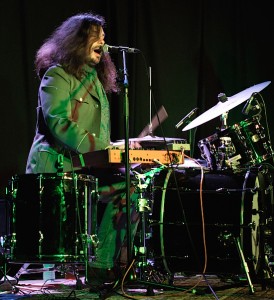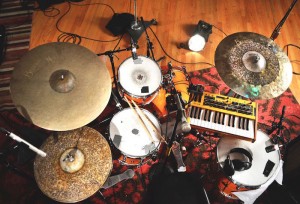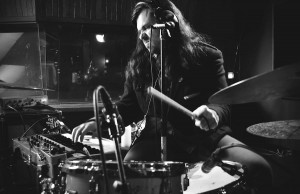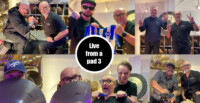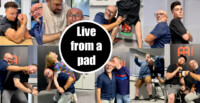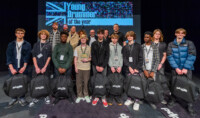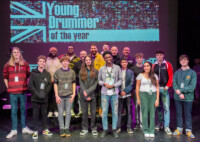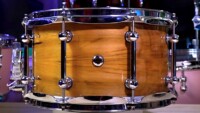While the rest of us are busy enough “just” playing drums, Josh Dion redefines the term ‘multitasking’ by not just being an outstanding drummer, but topping it all of with groovy synth playing and top class singing.
Having paved his way as a working drummer with artists like Chuck Loeb, Bill Evans, and Esperanza Spalding (to name a few), Dion’s heart had always been at the front of the stage.
After a long journey of searching the right platform, Josh now focuses on touring with duo bandmate Geoff Kraly (bass) fascinating audiences all over the world.
Not least thanks to the viral success of their performance video to ‘Vision Complete’, Dion has also become an in-demand clinician and a well recognised face amongst the drumming community.
I caught up with Josh at a clinic in London to talk about his upbringing, his musical influences and the unique ways of his band Paris Monster.
Your dad is a drummer too. Was it him who got you into drumming?
Yes, he played professionally but I don’t actually remember starting drums – that’s the thing that’s really beautiful about it.
My dad gave me a snare drum as soon as I could hold a stick; I got a 61 Slingerland Champagne Sparkle when I was 3. I was a lucky kid. We didn’t have a lot of money, but I always had records and drums. I grew up playing to Allman Brothers, Pink Floyd, I knew all of Nick Mason’s fills, Ringo, ‘Carry That Weight’, ‘Moby Dick’… I was trying to play all that stuff.
I had an older brother who introduced me to Cream and The Grateful Dead. I remember looking at Wheels of Fire by Cream back then and noticing that most of the writers had different names than the guys in the band. It caught my attention even as an 8-year-old and I got really curious about who Robert Johnson or Willie Dixon were; through that I discovered the blues.
My Dad had a lot of odd jobs besides being a drummer and worked at the high school during summer when the kids weren’t there. I would go along, sit in the library all day and look up blues records, make posters and cut out photos of jazz and blues musicians and put them up in my room. I was like a little geek. It was a really good time in my life: I was kind of like a child prodigy, I was playing drums really well, doing talent shows, pubic access television drum solos and stuff like that. I knew every note of the Gene Krupa story and it really influenced me.
I really have my dad and my family to thank for all that – they were always very supportive of music.
So most of your musical influences stem from your family?
Yes. My father and uncle are both drummers. My older brother is an encyclopaedia of music. My family on my mother’s side are hip and have supported the arts my entire life.
Your music nowadays is very funk influenced. Where did that influence come from?
I got into funk once I got into high school. A friend of mine played me some Parliament one day. Wow! I hadn’t be exposed to black music like that. Maybe Stevie Wonder and Motown. I started to grasp what “on the one” funk was. I began to check other bands that stemmed from that concept. The Gap Band, Slave, Bar’Kays (’70’s). At the same time I discovered Earth, Wind and Fire, who’s spiritual lyrical message and all embracing eclectic sound spoke to me. All of a sudden all these lights started to go on. I think Earth, Wind and Fire helped me with the spiritual thing; Parliament helped me with the attitude of funk.
Also, I had exactly one instructional drum video and that was Dennis Chambers, and he talked about Parliament/Funkadelic a lot.
All this happened at once and I became obsessed with funk. I became the funk guy and even got a radio show. I just absorbed it for years.
You went on to study jazz though?
I took a year off from college and started doing jazz gigs around town. I started playing like Philly Joe Jones and guys were hiring me. I’m doing gigs around Connecticut. I got myself an old ‘K’ and an 18”/12”/14” old kit; started learning how to play like the cats, studying Philly Joe, Max Roach, Art Blakey, Art Taylor, and the list is endless.
There was a jazz jam on Tuesdays in my little town. I began to hang and learn. One day someone mentioned a college in Jersey called William Paterson. Something rung with me. I wasn’t sure about living in proper New York at the time and Jersey seemed like the right step. So I applied to a couple of schools and got into all of them. I couldn’t believe it. All of them were incredibly expensive but luckily William Patterson was a State university. So I moved to New Jersey, got some gigs, got a gig in a local band and before I knew it I was making twice my rent money in a week. I was set.
I wasn’t a great student but more than anything I was around great players who were growing and really interested. William Paterson always had a great faculty: Rufus Reid was there during my first year and I learned a ton from that man. Horacee Arnold talked to me about the different sides of the beat. John Riley broke down the bebop language. Rich Derosa believed in my ability to be melodic. I was surrounded by like minded humans. The whole thing was really a journey.
You started touring straight out of university.
I actually never finished school because I got a gig with a band called Ulu. The instrumentation was similar to Headhunters (Herbie Hancock). They were established in the jam band scene and they took me out on the road. It was good for me. The music was open, groovy, free, in odd time signatures, some jazz influence and psychedelic enough for a Connecticut hippie kid.
It was great and we made some good music. Also, during the tours, I began writing in a journal, which led to writing my first songs. I would sit in the back of the van all day and try to be inspired. It was all very fresh. I wrote most of my first band’s first album in the back of that van.
I eventually left Ulu to start playing with guitarist Chuck Loeb. Chuck was responsible for introducing me to the entirety of the established New York scene. I met many of my heroes, got to play with musicians I really looked up to, through him. Randy Brecker, Will Lee, Bill Evans, all the cats I met through Chuck. He also introduced me to the beautiful country of Spain, which is my second home (in my mind). I’ll always remember that. He recently made his transition into the next world.
He was a great human being and an amazing musician, who showed me a lot of love.
From that first album in the back of the Ulu van the original music side of things was always going on?
Yes. I got into the singer/songwriter thing. Learned enough guitar to get by and started going to coffee houses and open mics.
Then I started the Josh Dion Band, which an epic roots rock ensemble made up of some of my closest friends from Paterson. We began building a local NYC following. Being a frontman and singer from the drums helped define my personal style. I had been classmates with so many great musicians. Everybody wants to find a thing. I found mine. It all started to make sense.
There was a great crew of writing, singing, badass musicians who played all the clubs in NYC. We all played together and created a vibe. The Bitter End was ground zero for me for six solid years. That place is still magical to me. One of said musicians was Geoff Kraly, the other half of Paris Monster.
Had you known Geoff long before Paris Monster?
I met Geoff around 2000. He was best friends with one of my best friends. We always played little gigs together. Around the time Paris Monster began, Geoff was doing some really unique stuff with the bass, pedals, and synths. He also had become an amazing writer. His lyrics were thought provoking, odd and unlike anything I had read. We were both doing something new and it seemed like a great idea to combine the two things.
How did the name ‘Paris Monster’ come about?
It’s an old historical term and means “passionate beast” or something like that – but we just like the way it sounds.
I know you guys are working on a new album?
Yes, but we’re still in the process so there is no release date yet.
You have done quite a lot of session work over the years too. Does the session side still excite you?
I have done a decent amount of session work. I’ve had some glorious moments capturing things. I like when producers are conceptual, and working out beats and feels. I like performance based recording, when you’re literally capturing something live and raw. All of the above. My favourite though is when I’m at the helm and in a place to make decisions.
After the viral success of your Vision Complete video you performed at quite a few drum shows as well?
Yes. The drum festival thing is very cool because I get to get up on stage and just make music. It’s really an open palette. Hopefully Paris Monster is gonna be doing some more this year as a full band. If it’s only me I always try to open up to some different things like getting into the arpeggiator or tape down keys. That way the keyboards keeps constantly going and I can just play drums and experiment.
Also it’s a great opportunity to check out other players. I’m always surrounded by great technical players as well as great groove players. It can also be a bit of a weird scene sometimes too though. Like a weird, alternate reality of drum worshippers. That’s something that I never knew existed till the past couple of years. It’s really cool and I’m very happy to be in that scene right now.
Even before Paris Monster you always used to play drums, keys and sing at the same time. Did the multitasking side of it come natural to you or was it a big challenge?
It’s really just utilising the knowledge I have of all the instruments and putting them all together. That’s really it. I’m not a piano player in the sense that I’m not gonna sit down and shred on stride piano or play a gig where you’re gonna have your mind blown. The synth bass makes sense for me. It serves the band, it’s fun and it is challenging. It wasn’t easy at first but we worked on it and now it sure feels good.
Two-handed playing vs. one-handed playing. Does it feel weird to you now having a second stick in your hands?
No. Well maybe subconsciously it has changed me, but the style I play when I play with Geoff (Paris Monster) is so developed by at this point that I have certain feels that just work with what we do. Ghost notes and ways of playing the hi hat with my foot… that has kind of become the groove and it just all settles in in this weird way – just because we’ve done it for a while now.
So you have redeveloped your drumming a bit to avoid restrictions?
Yeah, because it’s so simple in the left hand, but there is ghosting going on with both the left and the right hand. There is still the meat and the grease.
Did that redeveloping change your two-handed playing too? Have you maybe noticed you’re playing less notes?
I don’t think that when I play drums in general I usually play a lot of notes. And if I do, I usually listen back and don’t like it. You know what I mean? It’s almost a running joke with myself: Play with one hand because that’s about as well as I can do anyway. That isn’t entirely true of course but I don’t know where I am with the whole drumming thing. I like the way Paris Monster sounds and I don’t think it’s lacking anything drum-wise, so I’m just gonna keep going with it. I continue to be influenced by drummers who are breaking ground with the instrument with a traditional sense of playing – with two hands. I’m still growing in that sense obviously.
You mentioned in your clinic that your right hand approaches the synth a bit like it would the ride cymbal?
Totally yes. I use really simple patterns like the paradiddles and ratamacues. I don’t know if I’m consciously thinking about it but that’s basically all it is. Different patterns, different polyrhythms, sometimes the kick would be a 16th note off the vocal melody and so on. It’s just basic independence like any other thing you would work on but it’s all to the grid in some way.
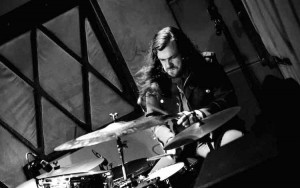 Are there any specific exercises you did to develop this or did it just come natural by doing it?
Are there any specific exercises you did to develop this or did it just come natural by doing it?
Just doing it; you then develop patterns that, I guess, become exercises after a while.
Did you have to change your set up to accommodate what you’re doing?
The floor tom is really far away from me now so you can’t really do so much crossover stuff, which I kind of don’t care about. I’ve moved the tom and the snare in front of me in this weird way. I don’t know, the whole drum kit is just a little slanted now but it works really well for Paris Monster. All in all it’s still just a drum kit with a keyboard.
I read somewhere that you tune your drums lower to fill gaps in the music?
I’m trying to but it changes. Sometimes we get into a room and I realise that the snare drum needs to have more of a crack kind of sound. Obviously we have a lot of bass so sometimes the low snare doesn’t work. When we are in the studio to make a record, I would say 85% of the time we use low snare tuning.
When we started off it was all very deep tuned and it was cool, so I don’t know where we’re gonna end up with that. Lately we’ve been putting that through electronics (the modular synth) – there is one track on the new record that uses that – and I think we might be experimenting with this more. We will see what happens.
You set up your hi-hat pedal at a 90º angle to your foot. Do you just prefer it that way?
It happened randomly on a session one day and i liked the way it felt. Now it makes sense with the new set up too. Gotta find weird things to keep you happy.
You’ve been doing more and more clinics recently. Has the education side of things always been a passion of yours?
Yes. Being a part of clinics and drum festivals has allowed me to focus on what i have to offer and what i really wanna sound like. I enjoy sharing anything i can with people who wanna know.
Finally, what’s next?
There is a bunch of touring in Europe this summer so check out Parismonster.com for all the dates. Also is looks like we’re finalising the UK Drum Show in Manchester and some other UK dates, so that will be very exciting. All that plus getting the album out and making some cool videos…
Thanks a lot for your time Josh!
Interview by Tobias Miorin
May 2018

